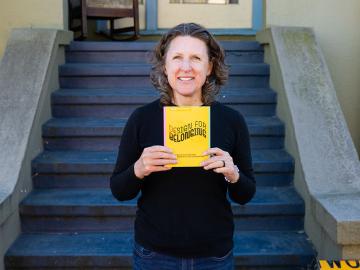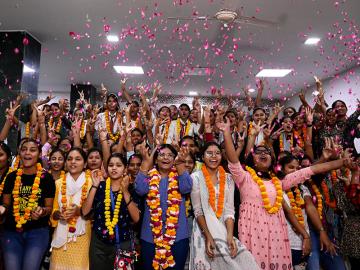The changing purpose and process of philanthropy: Aparna Piramal Raje
For those wanting to be agents of change, it is essential to have domain knowledge of the subject, find the right partners and make multiplier impact the benchmark of giving
They testify mental health therapy is a lifeline, yet not a need that is always recognised by donors
Illustration: Chaitanya Dinesh Surpur
The pain is palpable as we sit together in a circle, but so is the resilience. On the wall is a custom-made bookshelf, designed to spell the words, Kranti. This is the suburban Mumbai shelter home of the Krantikaris, a group of adolescent girls, all daughters of sex workers from Kamathipura, Mumbai’s red-light district. Kranti was founded by Robin Chaurasiya to create revolutionary leaders from India’s most marginalised communities. Today it houses 19 girls, an extraordinary sisterhood of struggle and triumph. The girls share their stories—of sexual, emotional and physical abuse, but also of healing and recovery, of hopes and dreams for the future. The Krantikaris, as they call themselves, are agents of social change: First-generation college-goers, studying in prestigious universities such as Ashoka University, Krea University or abroad, and returning to India to contribute to the communities they grew up in and to society at large.
One such individual is Krantikari Shraddha, who received a full scholarship to do a 12-week residency at the Cow House Studio, an artist-run school and residency on an Irish farm. “Shraddha definitely found the programme challenging, but it pushed her to explore and create some new art while deepening her understanding of her own creative process. She is now working with the students at a government school in the Kamathipura red light area, the community where most of us grew up,” says Tara-Shweta Katti, who was the first girl from Kamathipura to receive a full scholarship to study abroad—in Italy—and is now working full time with Kranti having completed her studies.
My father Dilip Piramal and I sponsor the annual mental health therapy costs of the Kranti girls. They testify therapy is a lifeline, yet not a need that is always recognised by donors. “I’ve had a messy past, I’ve been raped, society has tagged me as the daughter of a sex worker. But I have grown through therapy, it has made me believe I am valid in the world, and now I can give back to marginalised communities. At Kranti, we believe that food is not as important as therapy because unless we are happy from inside, we won’t be able to express that outside. Just as food satisfies our hunger, therapy feeds our soul,” says Krantikari Taniya.
I myself live with bipolar disorder, a serious mental health condition, and see a therapist twice a month, so I know just how vital therapy is for the Krantikaris, many of whom have clinically diagnosed mental health conditions, in addition to the trauma that brings them to the shelter.
Also read: People give for a selfish reason—to feel good: Luis Miranda, Nimisha Pathak
Evolving Journey
My journey as a philanthropist might echo with many others. And I would like to add that I still consider myself a newcomer in this field, having started giving only a few years ago.Initially, I gravitated towards conventional causes such as health and education, which were easy to identify with. Unsure of where to start and how to give, it was important for me to partner with established non-profits in these fields such as Dasra, Magic Bus and ARMMAN. So, I did some fundraising for tech-for-health NGO ARMMAN by bringing together members of my housing complex to form a consortium for a giving circle facilitated by Dasra, whose founders I had known for many years.
I have also involved my children in giving by asking for contributions to sports-for-development NGO Magic Bus, in lieu of gifts at their birthday parties, and taken them to Magic Bus sessions to see the impact of their giving. I’ve known Magic Bus for a long time too, and it is a cause that children can relate to.
My family and I donated to my alma maters—again educational institutions that we trust and respect. And I supported the founding of Wonder Girls, a learning platform for adolescent girls, which exposes them to strong role models, in partnership with established non-profits and government schools. I met some remarkable individuals along the way, and as I always maintain, I got back much more than I gave, in terms of joy, intellectual stimulation and emotional validation.
Also read: Vita and Jalaj Dani: Creating self-sustaining communities
Turning Point
Close to a decade into my philanthropic journey, I am in a very different place. Today, my focus is on mental health. In addition to Kranti, I support Talk To Me, a mental health non-profit founded by clinical psychologist and psychotherapist Narendra Kinger, based in Mumbai. Talk To Me makes mental health therapy services accessible to underserved members of the society, and I have helped them with fundraising, recruitment and strategy.The turning point from conventional causes to something as specific as mental health was the publication of my book, Chemical Khichdi: How I Hacked My Mental Health in May 2022. Part-memoir, part self-help, the book describes my journey of living and learning to thrive with a serious mental health condition, and outlines a pathway for healing and recovery for individuals with such conditions, their caregivers, friends, allies, colleagues and mental health professionals, that is everyone who loves and cares for them.
The book has been well-received since its launch and I am now a mental health advocate, speaking in various forums, including companies, non-profits and in traditional and social media. I have a small team of freelancers who work with me on what we call ‘The Chemical Khichdi Project’, whose mission is to shape the narrative, conversation and dialogue on mental health in India. Given my business background, and understanding of business leadership and workplaces, we are keen to work with companies in particular, as work-related stress is such a big cause of mental health issues.
From a philanthropic point of view, I want to amplify this mission by embedding mental health into the arts by collaborating with arts organisations, including dance, music, theatre, stand-up comedy and fine arts. I believe that this could be the most powerful and subtle way to spread awareness of the importance of emotional and mental well-being, and to shape the conversation on the subject.
For example, the first mental health talk I did was called ‘Healing Through The Arts’ hosted by Sunaina Kejriwal and held at Bajaj art gallery in Mumbai, to complement their exhibition at the time, on ‘Investigating mental health through art’. The talk and the arts exhibition shook hands with each other really well, making mental health accessible, informative and entertaining to the audience, and going beyond a conventional talk on arts therapy. I think we need much more of this for our message to really scale, and reach people’s hearts and minds, and I’m looking forward to developing this mission.
Also read: Radhika Bharat Ram: Empowering girls with education, agency
Lessons Learnt
I learnt three lessons along the way which can perhaps be helpful to others on a similar journey.First, domain expertise allows one to find a niche where you can make a real difference. It sounds obvious, but the fact is that with so many genuine causes and worthwhile non-profits out there, it becomes hard to choose where one can have the most impact. Climate change or sanitation or legal reform? One may be passionate for more than one area. The publication of Chemical Khichdi helped me to realise that I had developed expertise in my subject, and that my efforts are best employed in this area, and that even though there are many other causes I care about, it might be best to focus on one for the time being, given limited time and budgets.
Second, finding the right partners is essential. This is also a truism in any sector, but especially in the development sector when one has to trust founders. There have been times when I have limited my fundraising or my contributions because I did not feel fully aligned with the founder. It is also important to have the right advisors. I was fortunate to find researcher Kriti Krishnan with mental health domain knowledge and a non-profit background, who not only contributed to Chemical Khichdi, but also expanded my understanding of the field, which has been invaluable.
Lastly, multiplier impact is my benchmark for giving. With the Kranti girls, I truly believe that through therapy, the other rehabilitation efforts, and their own resilience, empathy and strength, we are seeing agents of future social change. I hope that whatever else I do in this space, I can help organisations to similarly deliver a multiplier impact in innovative and pioneering ways.
It is often said that ‘the purpose of life is a life of purpose’. I count myself lucky that my vulnerability has imbued me with a definitive sense of purpose. Earlier, I wanted to make a difference and was searching for direction. Now I feel focussed and humbled by the task ahead, and I am excited to make change. It is a very fulfilling feeling.
Check out our Festive offers upto Rs.1000/- off website prices on subscriptions + Gift card worth Rs 500/- from Eatbetterco.com. Click here to know more.
(This story appears in the 10 March, 2023 issue of Forbes India. To visit our Archives, click here.)














